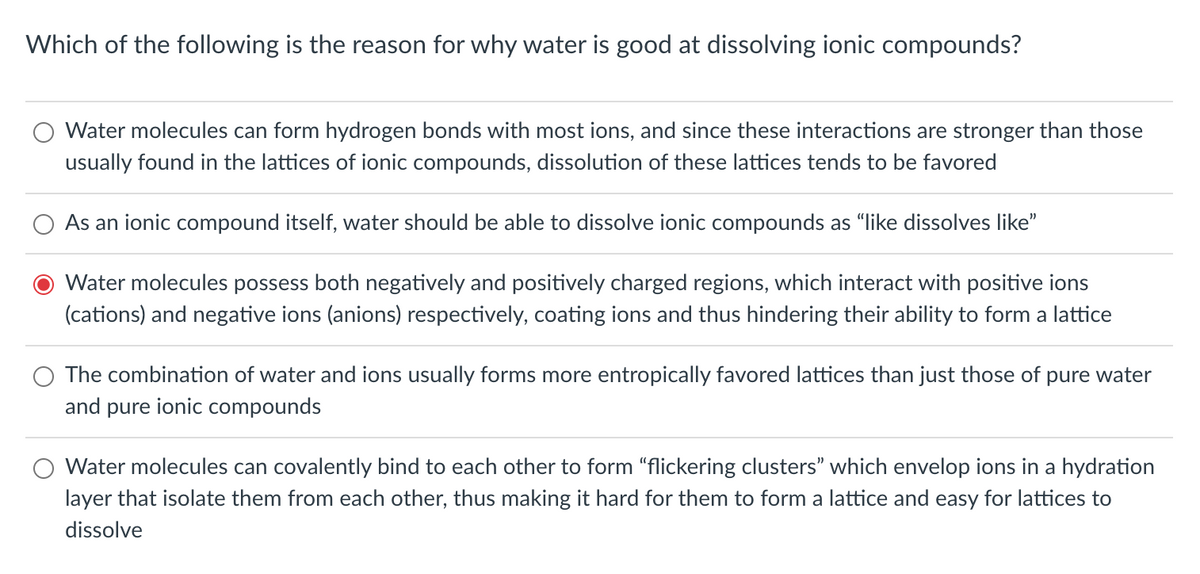Which of the following is the reason for why water is good at dissolving ionic compounds? Water molecules can form hydrogen bonds with most ions, and since these interactions are stronger than those usually found in the lattices of ionic compounds, dissolution of these lattices tends to be favored O As an ionic compound itself, water should be able to dissolve ionic compounds as "like dissolves like" O Water molecules possess both negatively and positively charged regions, which interact with positive ions (cations) and negative ions (anions) respectively, coating ions and thus hindering their ability to form a lattice O The combination of water and ions usually forms more entropically favored lattices than just those of pure water and pure ionic compounds O Water molecules can covalently bind to each other to form "flickering clusters" which envelop ions in a hydration layer that isolate them from each other, thus making it hard for them to form a lattice and easy for lattices to dissolve
Which of the following is the reason for why water is good at dissolving ionic compounds? Water molecules can form hydrogen bonds with most ions, and since these interactions are stronger than those usually found in the lattices of ionic compounds, dissolution of these lattices tends to be favored O As an ionic compound itself, water should be able to dissolve ionic compounds as "like dissolves like" O Water molecules possess both negatively and positively charged regions, which interact with positive ions (cations) and negative ions (anions) respectively, coating ions and thus hindering their ability to form a lattice O The combination of water and ions usually forms more entropically favored lattices than just those of pure water and pure ionic compounds O Water molecules can covalently bind to each other to form "flickering clusters" which envelop ions in a hydration layer that isolate them from each other, thus making it hard for them to form a lattice and easy for lattices to dissolve
Chemistry: Principles and Reactions
8th Edition
ISBN:9781305079373
Author:William L. Masterton, Cecile N. Hurley
Publisher:William L. Masterton, Cecile N. Hurley
Chapter10: Solutions
Section: Chapter Questions
Problem 81QAP: Beaker A has 1.00 mol of chloroform, CHCl3, at 27C. Beaker B has 1.00 mol of carbon tetrachloride,...
Related questions
Question

Transcribed Image Text:Which of the following is the reason for why water is good at dissolving ionic compounds?
Water molecules can form hydrogen bonds with most ions, and since these interactions are stronger than those
usually found in the lattices of ionic compounds, dissolution of these lattices tends to be favored
As an ionic compound itself, water should be able to dissolve ionic compounds as "like dissolves like"
Water molecules possess both negatively and positively charged regions, which interact with positive ions
(cations) and negative ions (anions) respectively, coating ions and thus hindering their ability to form a lattice
The combination of water and ions usually forms more entropically favored lattices than just those of pure water
and pure ionic compounds
Water molecules can covalently bind to each other to form "flickering clusters" which envelop ions in a hydration
layer that isolate them from each other, thus making it hard for them to form a lattice and easy for lattices to
dissolve

Transcribed Image Text:Carbonic acid (H₂CO3) has a pKa₁=6.4 and pKa2=10.3. If the pH of the pure solution is 3.5, what is the
predominant molecule present?
A. H₂CO3
B. HCO3
C. CO3²-
D. HCO2
Expert Solution
This question has been solved!
Explore an expertly crafted, step-by-step solution for a thorough understanding of key concepts.
Step by step
Solved in 3 steps

Knowledge Booster
Learn more about
Need a deep-dive on the concept behind this application? Look no further. Learn more about this topic, chemistry and related others by exploring similar questions and additional content below.Recommended textbooks for you

Chemistry: Principles and Reactions
Chemistry
ISBN:
9781305079373
Author:
William L. Masterton, Cecile N. Hurley
Publisher:
Cengage Learning

Chemistry & Chemical Reactivity
Chemistry
ISBN:
9781337399074
Author:
John C. Kotz, Paul M. Treichel, John Townsend, David Treichel
Publisher:
Cengage Learning

Chemistry & Chemical Reactivity
Chemistry
ISBN:
9781133949640
Author:
John C. Kotz, Paul M. Treichel, John Townsend, David Treichel
Publisher:
Cengage Learning

Chemistry: Principles and Reactions
Chemistry
ISBN:
9781305079373
Author:
William L. Masterton, Cecile N. Hurley
Publisher:
Cengage Learning

Chemistry & Chemical Reactivity
Chemistry
ISBN:
9781337399074
Author:
John C. Kotz, Paul M. Treichel, John Townsend, David Treichel
Publisher:
Cengage Learning

Chemistry & Chemical Reactivity
Chemistry
ISBN:
9781133949640
Author:
John C. Kotz, Paul M. Treichel, John Townsend, David Treichel
Publisher:
Cengage Learning

Chemistry
Chemistry
ISBN:
9781305957404
Author:
Steven S. Zumdahl, Susan A. Zumdahl, Donald J. DeCoste
Publisher:
Cengage Learning

Chemistry: An Atoms First Approach
Chemistry
ISBN:
9781305079243
Author:
Steven S. Zumdahl, Susan A. Zumdahl
Publisher:
Cengage Learning
